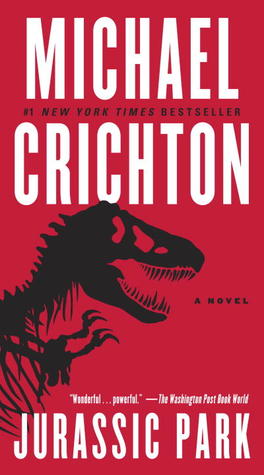Billionaire philanthropist John Hammond creates a theme park of cloned dinosaurs based on the new technique of recovering dinosaur DNA from gnats and ticks trapped in amber. Prior to the park opening, Hammond invites paleontologist Alan Grant and his paleobotanist graduate student Ellie Sattler to serve as new consultants to a team already pessimistic about the park, including famous mathematician and chaos theorist, Ian Malcolm, and lawyer Donald Gennaro. Together with Hammond’s grandchildren, the group explore Jurassic Park as guests until an act of corporate espionage, a power outage, and a tropical storm plunge the entire park into chaos.
This blockbuster bestseller is Crichton’s signature novel, made even more famous by the film of the same name, so I do not expect anything more than an entertaining thriller with a scifi bent. As it turns out, even those expectations are too high. The brilliantly original idea is hobbled by terrible prose, with awkward sentences and bulky exposition, and flat characters and luke-warm action sequences. If entire swaths of lengthy pseudo-intellectual conversations between Hammond and Malcolm were cut out, I may have given Jurassic Park a 2-star rating.
But Crichton’s story about the collapse of an amusement park of genetically-created dinosaurs is first and foremost a cautionary tale about genetic engineering and an illustration of his interpretation of chaos theory. He co-opts broad fields of science as he understands them and churns out a non-scifi thriller rife with wild inaccuracies about unearthing fossils, extracting DNA, cloning DNA, recreating an animal that lived 65 million years ago, etc. The fact that he tries to sneak his un-founded un-researched anti-science agenda into the novel is terribly offensive, so I’m downgrading this book to a 1-star.
“You know what’s wrong with scientific power? It’s a form of inherited wealth. And you know what assholes congenitally rich people are.”
